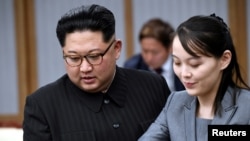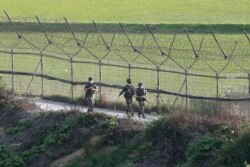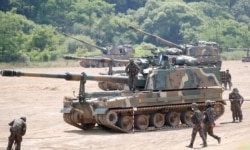North Korean leader Kim Jong Un has suspended unspecified military action against South Korea, state media said Wednesday, an apparent reduction in tensions following weeks of threats from Pyongyang.
At a preliminary meeting of the ruling party’s central military commission, Kim “took stock of the prevailing situation and suspended the military action plans against the south,” according to the Korean Central News Agency.
It is not clear exactly what steps Kim suspended and whether that means North Korea will now end its escalating campaign of provocations toward the South.
The moves surprised many in Seoul, where officials had been preparing for a possible extended downturn in relations.
A spokesperson for South Korea’s Unification Ministry, which handles relations with Pyongyang, said Seoul was monitoring the situation and would continue to adhere to inter-Korean agreements.
North Korea is upset at the South for failing to move ahead with a series of 2018 deals related to economic cooperation and reducing military tensions. International sanctions against North Korea have prevented Seoul from fully implementing the deals.
This month, North Korea took several steps to roll back many aspects of those inter-Korean agreements, including by demolishing the two countries’ de facto embassy just north of the border.
The North also threatened to redeploy troops in parts of the demilitarized zone, resume military exercises in the border area, and cut off all official lines of communication with the South Korean government.
In addition, state media have warned that North Korean university students are preparing to float 12 million propaganda “leaflets of punishment” into the South via thousands of balloons.
Why now?
The threats fit a familiar negotiating strategy for North Korea: escalate tensions in order to later de-escalate, possibly to receive concessions or restart diplomacy.
But it’s not clear why North Korea would de-escalate now, since it received no obvious concessions from the South, Ramon Pacheco Pardo, a Korea specialist at King’s College London, said.
“It does seem a bit early to de-escalate,” Pacheco Pardo said. “Clearly they weren't getting anything from South Korea other than a stern response. So that could be a reason.”
Last week, the South Korean military said the North will “definitely pay” if it conducts any military provocation.
Good cop?
Many of North Korea’s threats this month were delivered by Kim Yo Jong, the increasingly powerful sister of Kim Jong Un.
By making Kim Yo Jong the public face of the pressure campaign, North Korea may have been trying to preserve Kim Jong Un’s ability to eventually reverse course and improve relations with Seoul.
However, many analysts caution it’s too soon to say whether the North has fully changed course, in part because its latest statement said only that the military action had been “suspended,” not reversed.
“The way it's worded, it seems to be a wait-and-see approach before deciding on the next step; i.e., more de-escalation or re-escalation,” Pacheco Pardo said.
As of midday Wednesday, North Korea had given at least two other signs de-escalation was on the horizon.
After Kim’s announcement that military action had been suspended, two North Korean propaganda outlets, DPRK Today and Meari, removed several recent articles that were critical of the South.
North Korea also began removing propaganda loudspeakers it had recently reinstalled on the DMZ, according to South Korean media.
For decades, the two Koreas used the loudspeakers to denounce each other’s governments, as part of a psychological warfare campaign. The speakers were removed in 2018 as part of the inter-Korean military tension-reduction agreements.






